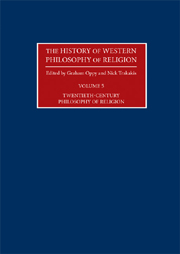Book contents
- Frontmatter
- Contents
- Editorial Introduction
- Contributors
- 1 Twentieth-Century Philosophy of Religion: An Introduction
- 2 William James
- 3 Henri Bergson
- 4 John Dewey
- 5 Alfred North Whitehead and Charles Hartshorne
- 6 Bertrand Russell
- 7 Max Scheler
- 8 Martin Buber
- 9 Jacques Maritain
- 10 Karl Jaspers
- 11 Paul Tillich
- 12 Karl Barth
- 13 Ludwig Wittgenstein
- 14 Martin Heidegger
- 15 Emmanuel Levinas
- 16 Simone Weil
- 17 A. J. Ayer
- 18 William P. Alston
- 19 John Hick
- 20 Mary Daly
- 21 Jacques Derrida
- 22 Alvin Plantinga
- 23 Richard Swinburne
- 24 Late-Twentieth-Century Atheism
- Chronology
- Bibliography
- Index
8 - Martin Buber
- Frontmatter
- Contents
- Editorial Introduction
- Contributors
- 1 Twentieth-Century Philosophy of Religion: An Introduction
- 2 William James
- 3 Henri Bergson
- 4 John Dewey
- 5 Alfred North Whitehead and Charles Hartshorne
- 6 Bertrand Russell
- 7 Max Scheler
- 8 Martin Buber
- 9 Jacques Maritain
- 10 Karl Jaspers
- 11 Paul Tillich
- 12 Karl Barth
- 13 Ludwig Wittgenstein
- 14 Martin Heidegger
- 15 Emmanuel Levinas
- 16 Simone Weil
- 17 A. J. Ayer
- 18 William P. Alston
- 19 John Hick
- 20 Mary Daly
- 21 Jacques Derrida
- 22 Alvin Plantinga
- 23 Richard Swinburne
- 24 Late-Twentieth-Century Atheism
- Chronology
- Bibliography
- Index
Summary
Martin Buber (1878–1965) is best known in philosophical and theological circles for his dialogical philosophy of the I–thou relation, and within Jewish studies for his collections of Hasidic tales. These seemingly disparate writings are linked, together with Buber's mature work on the Bible, philosophical anthropology, Zionism and other subjects, by his central concern: the relationship between human beings and God or the ‘Eternal Thou’.
Buber was born in February 1878 in Vienna. His parents separated when he was a young child and he went to live with his paternal grandparents in Galicia. Initially, he assumed that he was only there temporarily and that his mother would return for him. In his “Autobiographical Fragments”, Buber describes the moment when he realized that she was never coming back, and says that everything he subsequently wrote about ‘genuine meeting’ had its origin in that moment (1967a: 3–4).
Buber's grandfather, Solomon Buber, was a respected scholar who published the first modern editions of Midrash. During the years that Buber spent with his grandparents he participated in Jewish religious life. However, when he returned to his father's house in Vienna at the age of fourteen, he abandoned Jewish observance and became interested in philosophy. At the universities of Vienna, Leipzig, Berlin and Zurich, between 1896 and 1899, he studied philosophy together with history of art, German literature and psychology.
Towards the end of his student years, Buber re-engaged with Judaism by joining the Zionist movement.
Information
- Type
- Chapter
- Information
- The History of Western Philosophy of Religion , pp. 91 - 104Publisher: Acumen PublishingPrint publication year: 2009
